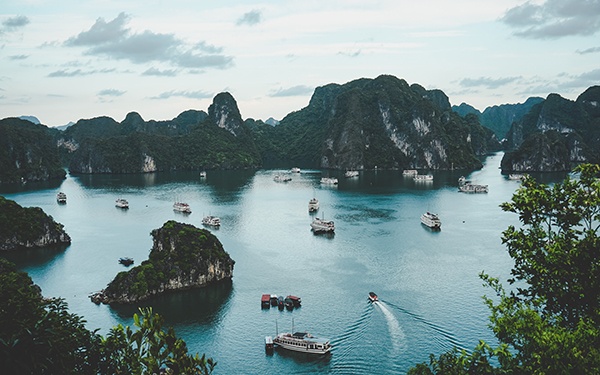Considering moving to Vietnam from the UK? Make sure that you read this first.
Endlessly beautiful and inspiring, Vietnam is an exotic and inspirational destination with vast national parks and cave complexes, bustling cities and rural mountain villages, atmospheric temples, incredible cuisine, and a complex and diverse culture.
It’s a fast growing expat destination, and one of the more popular places for retirees and expats living in Southeast Asia.
Here’s our ultimate guide to moving to Vietnam as a UK expat.
Contents
Vietnam Visa Requirements for Brits
Visiting
Up until 30 June 2021, British passport holders travelling for tourism or business can enter Vietnam for up to a maximum of 15 days without a visa.
For longer visits, a 1 month tourist visa can be applied for online, or alternatively a three-month multiple-entry visa.
Visas with a longer duration can sometimes be procured from the Vietnamese embassy before travelling to Vietnam.
Some longer term visitors choose to stay for longer by doing visa runs every 3 months, but this isn’t .a secure or even guaranteed way to stay in the country long term. You can learn more about this method here:
Working
When applying for a business visa in order to live and work in Vietnam, it is necessary to obtain a letter of sponsorship from a Vietnamese employer or other appropriate sponsor in order to gain official entry clearance from the Vietnamese Immigration Department.
Once procured, the business visa allows British citizens to live and work in the country for up to 1 year, and also allows for multiple entries into the country.
Permanent Residency
A permanent residence card (PRC) is is required for British expats who intend to reside in Vietnam for a long period of time.
In order to qualify for a PRC you will need to have already obtained a temporary residency card (TRC), have lived in Vietnam for 3 years, and fulfill at least one of the three following conditions:
- Be a person who fights for the freedom and independence of the Vietnamese race, for socialism, for democracy and peace and for science but who is suppressed
- A person with distinguished services contributing to the work of building and protecting the Vietnamese Fatherland
- A person being the spouse, child or parent of a Vietnamese citizen residing permanently in Vietnam
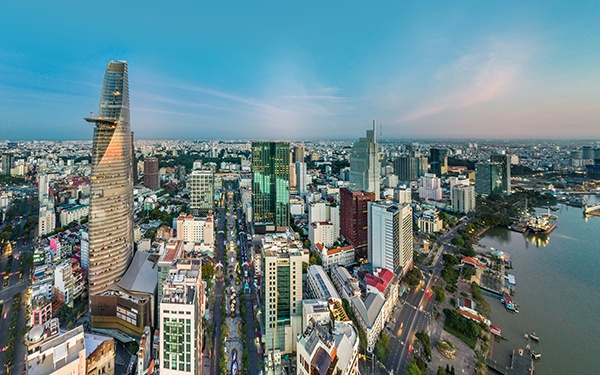
Way of Life in Vietnam
Lifestyle
Vietnam is a poor and densely populated country which has historically struggled economically and suffered huge losses due to war, but it is fast evolving and shrugging off the shadows of its past.
Vietnamese culture is vibrant and the people friendly, and the country’s natural beauty and laid back lifestyle are undeniably attractive.
Outdoor pursuits in stunning surroundings abound here, from hikes through jungle clad mountains to lazing on pristine beaches.
Vietnamese cities are chaotic and compelling, with fast growing expat communities.
Family is hugely important to the Vietnamese, with several generations often living together in the same home, and family events and get togethers form an important part of daily life.
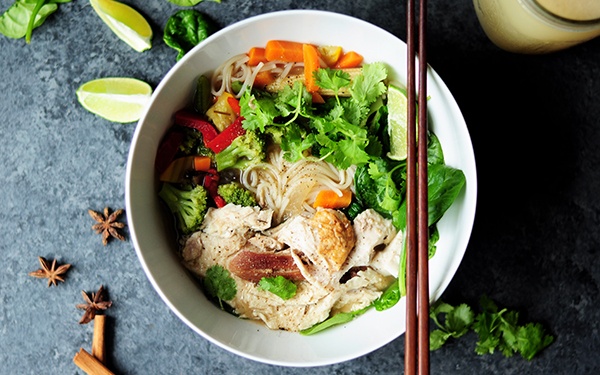
That said, with the growth in modernity and westernization, the young are very slowly transforming the everyday lifestyle and this has led to a certain divide between generations.
In rural areas the majority of Vietnamese work as farmers or fishermen and religion plays a significant role in their every day lives.
For most Vietnamese living in cities, working hours are long and hard, but evenings are spent relaxing with family and friends in restaurants and bars.
Getting Around
When it comes to travelling long distance in Vietnam, the best options are to fly or take the train or bus.
There are over 20 airports in the country, most offering frequent domestic flights, as well as regular flights to other hub cities throughout Asia.
Vietnam’s train network is extensive, and trains are often of a good standard with air conditioning and sleeper carriages. Train journeys across Vietnam can be very picturesque but often slow, which is why many people prefer to travel by bus.
Bus tickets are extremely affordable and the buses themselves are fairly comfortable. Open tour busees are the best option, although most don’t have facilities such as toilets on board, instead making regular stops at service stations. Government buses are constantly improving, but can still be crammed with passengers and their possessions, and getting from A to B can be slow progress.
Most major cities have their own bus networks with varying standards and prices.
Motorbike taxis called Xe Om are a speedy way to get around town, but be sure to negotiate a price beforehand. Rickshaws can be found in somes cities, and are a cheap way to beat the traffic.
Metered taxis are affordably priced, but make sure to stick to using reputable taxi companies to avoid being overcharged.
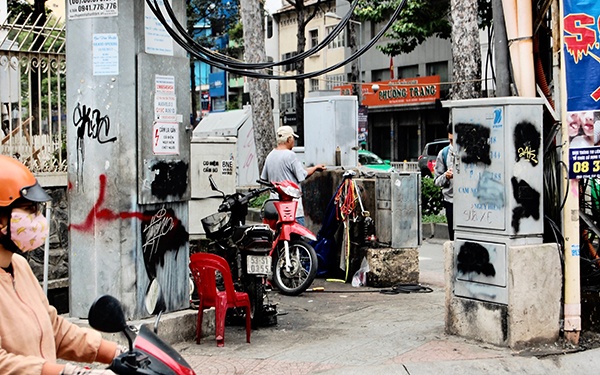
Driving in Vietnam
Travelling under your own steam -– particularly by motorbike -– is a good way for expats to get around in Vietnam, although in order to do so you will require local insurance and an International Driving Permit.
Hiring a car can be tricky however, and many vehicle hire companies only allow this if you are accompanied by a hired driver to chauffeur you around.
Getting your hands on a motorbike on the other hand is infinitely easier, and there are motorbike hire companies countrywide.
Be aware that when it comes to driving, rules and regulations rarely apply in Vietnam. Roads can be hazardous with poor surfacing, flooding, and livestock randomly wandering about, and other drivers notoriously dangerous.
Weather in Vietnam
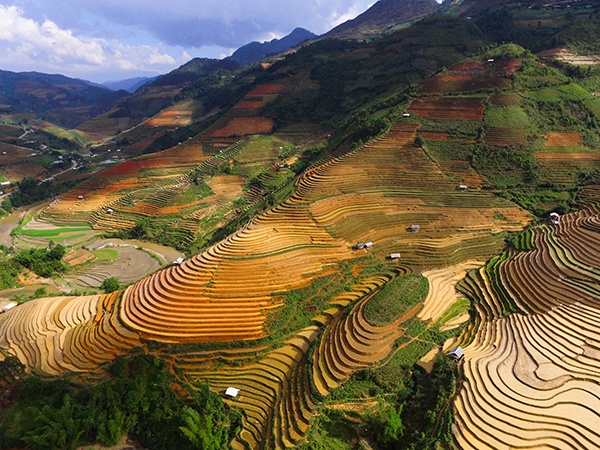
With both tropical and temperate zones, Vietnam has a varied climate depending on location, but annual temperatures range from 22°C to 27°C all year round.
In the south it can be incredibly hot, sunny, and humid, and prone to monsoon storms, while mountainous northern regions have a cooler climate and can be chilly during the winter months and warm during the summer.
The south has three seasons -– cold, rainy, and hot -– with the cold season occurring from November to April and the hot season from May to October.
The rainy season runs from late June or early July to November. Central areas are hit the hardest by the monsoon rains during the months of September to February.
Cost of Living in Vietnam
Lifestyle
By British standards the cost of living in Vietnam is extremely low. It’s well known as a favourite backpacker destination where it’s possible to live on very little – particularly in rural areas.
Most expats however prefer to make their home in the cities, with living costs varying between each city. Hanoi and Ho Chi Minh are the most expensive cities in Vietnam.
Groceries and eating out can be seriously inexpensive, particularly if you choose to shop in local markets or enjoy street food and understated Vietnamese restaurants. Alcohol such as beer can be bought for the equivalent of less than £1, although wine is more costly as it has to be imported.
Renting or buying a motorbike, or using public transport is very affordable, and fuel is cheap, so getting around won’t put too much of a dent in your wallet.
Vietnam has an amazing social scene, and most entertainments are reasonably priced. In the cities activities such as going to the gym and yoga or martial arts classes are similarly priced to those in the UK.
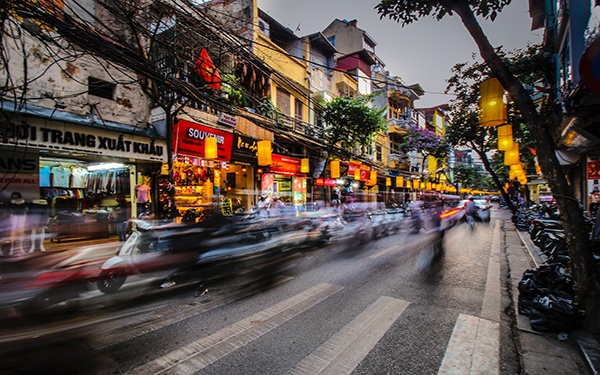
Rent
Accommodation is usually the biggest monthly expense for expats living in Vietnam.
There are a wide choice of accommodations available, from basic rooms in shared houses, to swanky high end apartments with swimming pools in the city center, with rental costs from anywhere between around £150 to £1000 per month.
Bills for utilities such as electricity, water, and internet, usually cost no more than around £40 per month, even in inner city areas.
Healthcare
For several years the Vietnamese government has been working towards implementing a state funded healthcare system, and more than half the Vietnamese population is now covered by the new scheme.
That said, it is advisable for UK expats to take out independent healthcare insurance whilst living in Vietnam. Many large companies employing expats make health insurance part of the employment package, but if that’s not an option make sure you take out adequate medical insurance to ensure you receive the best possible healthcare in case of an emergency.
As with any type of health insurance, the price of medical insurance for expats in Vietnam varies greatly depending on the age, medical history, family composition of the applicant and other factors.
Without health insurance, a visit to a doctor at an English speaking clinic could cost as much as £90, and a 24 hour stay in hospital a staggering £700.
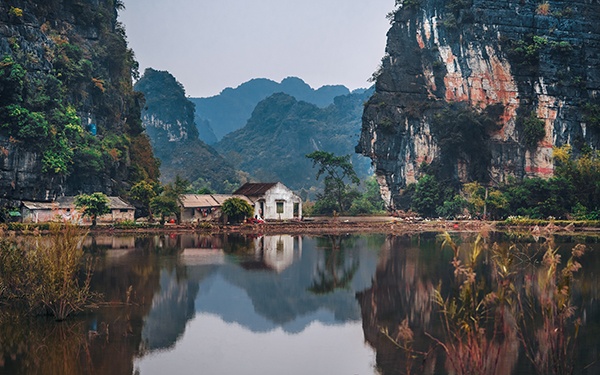
Schooling
Vietnamese public schools are extremely strict and, generally speaking, have little appeal for expat families.
The majority of UK expats choose to enrol their children in one of a growing number of international schools which employ native English speaking teaching staff and follow more familiar teaching methods.
Costs for these international schools vary but none are cheap, with the average fees of around £15,000 for a primary or secondary education for each child.
Popular Areas for Brits
Hanoi
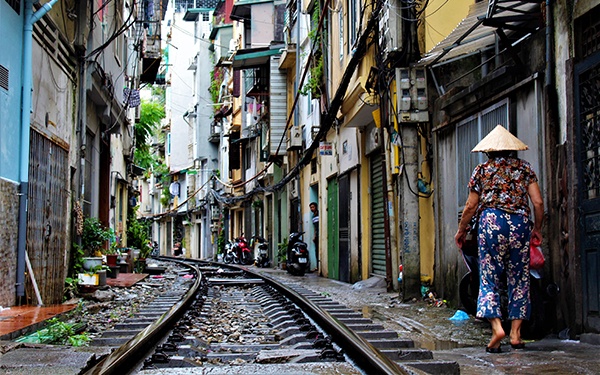
Hectic and electric Hanoi has a unique atmosphere flavoured with a colonial vibe that can be clearly seen in the French influenced architecture.
It’s a highly multicultural city with high number of French and Chinese citizens, all of whom have had an impact on the city’s culinary scene, pagodas, markets, and more.
Nightlife is lively with a plethora of bars, restaurants and nightclubs, and there are plenty of possibilities to shop until you drop.
Ho Chi Minh City
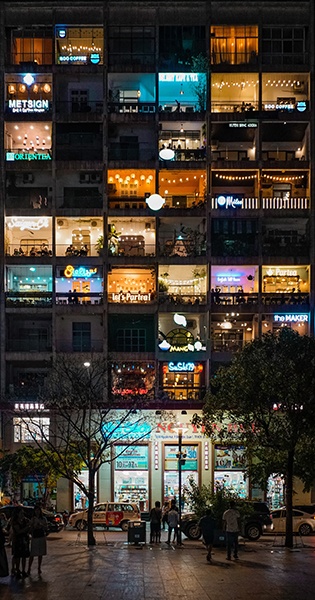
Another city popular with expats, Ho Chi Minh City is a chaotic urban sprawl with more excitement and entertainment than you can handle.
The expat community here is immense, and as the financial and business hub of Vietnam there are lots of employment opportunities here for Brits.
Rich in culture, skyscrapers share the space with classic French architecture, and fabulous restaurants and bars range from typical Vietnamese street fare to the most exclusive fine dining establishments.
Hoi An
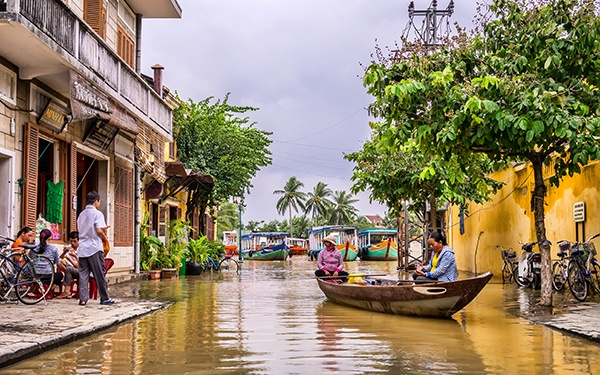
This UNESCO World Heritage site is a wonderful example of a Southeast Asian trading port dating from the 15th to the 19th century.
Its charming riverside setting and Japanese and Chinese influences create a uniquely atmospheric city.
Tea houses, temples, pagodas and cafés, excellent street markets, and a monthly full moon party combine to create an otherwordly, festive and romantic destination.
Danang
The third largest city in Vietnam, Danang is surrounded by impressive marble and limestone mountains and is the gateway to some of the country’s most stunning beaches in the south including My Khe Beach (aka China Beach).
It’s a fast growing city with increasing numbers of resorts springing up along the coastline which have welcomed a large number of expat workers.
Aside from wonderful beaches, the city has a whole host of other qualities, including great shopping including malls and markets, enticing cuisine, fantastic nightlife, and watersports such as diving and sailing.
Nha Trang
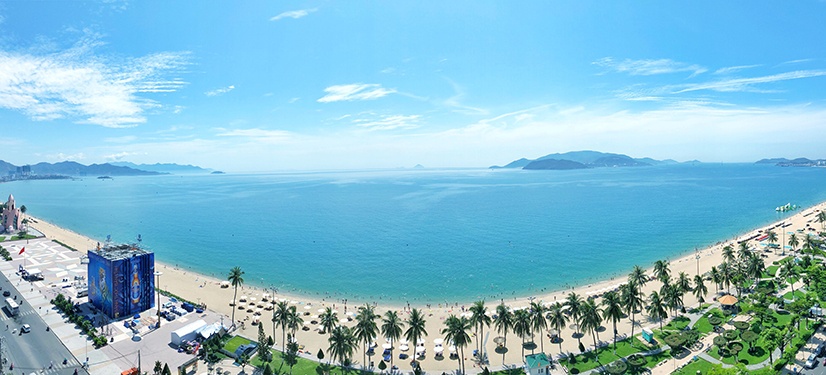
The Riviera of the South China Sea, Nha trang boasts a breathtaking coastline with thriving coral reefs, ancient architecture, atmospheric temples, tumbling waterfalls, glorious seafood restaurants, and natural hot springs.
It’s also a buzzing beach resort with a cosmopolitan style full of interesting boutiques, sculpture parks, and some amazing nightlife.
Phu Quoc
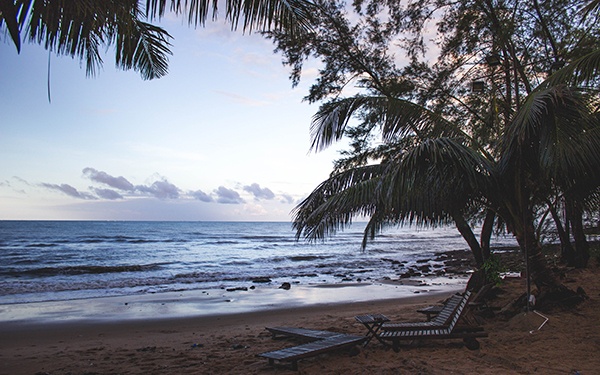
Vietnam’s island paradise, Phu Quoc sits picture perfect in the ocean. It boasts arguably the most exquisite beaches in Vietnam, all white sand and palm trees, and it’s the ideal laid back destination for lovers of sand, sun, sea and nature.
Lazing in a hammock sipping is a favourite pastime here, and you can eat fresh caught seafood right on the beach in a bamboo hut or dine in style at luxurious hotel restaurants.
Plunge into the turquoise waters and explore the underwater kingdom, or trek through the jungle covered hills to discover dramatic scenery and pepper plantations.
Jobs in Vietnam for British Expats
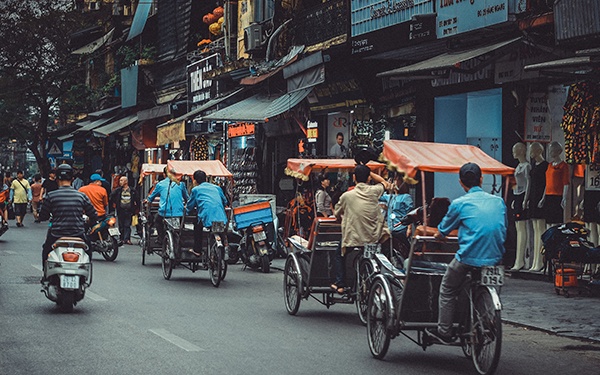
Vietnam’s rapidly growing economy has given rise to a wealth of job opportunities for foreigners.
The tourism and teaching industries are two main sectors of employment for British expats, but there are also increasing amounts of corporate positions available – particularly in trade and export, and banking sectors.
When applying for jobs in Vietnam, come armed with a competitive CV and a willingness to work hard according to the Vietnamese work ethic.
Are you considering moving to Vietnam from the UK?

